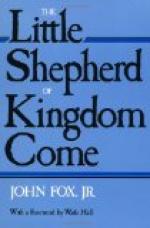Beyond rose the smoke of the old Turner cabin. On the porch sat the old Turner mother, her bonnet in her hand, her eyes looking down the river. Dozing at her feet was Jack—old Jack. She had never forgiven Chad, and she could not forgive him now, though Chad saw her eyes soften when she looked at the tattered butternut that Dan wore. But Jack—half-blind and aged—sprang trembling to his feet when he heard Chad’s voice and whimpered like a child. Chad sank on the porch with one arm about the old dog’s neck. Mother Turner answered all questions shortly.
Melissa had gone to the “Settlemints.” Why? The old woman would not answer. She was coming back, but she was ill. She had never been well since she went afoot, one cold night, to warn some Yankee that Daws Dillon was after him. Chad started. It was Melissa who had perhaps saved his life. Tad Dillon had stepped into Daws’s shoes, and the war was still going on in the hills. Tom Turner had died in prison. The old mother was waiting for Dolph and Rube to come back—she was looking for them every hour, day and night She did not know what had become of the school-master—but Chad did, and he told her. The school-master had died, storming breastworks at Gettysburg. The old woman said not a word.
Dan was too weak to ride now. So Chad got Dave Hilton, Melissa’s old sweetheart, to take Dixie to Richmond—a little Kentucky town on the edge of the Bluegrass—and leave her there and he bought the old Turner canoe. She would have no use for it, Mother Turner said—he could have it for nothing; but when Chad thrust a ten dollar Federal bill into her hands, she broke down and threw her arms around him and cried.
So down the river went Chad and Dan—drifting with the tide—Chad in the stern, Dan lying at full length, with his head on a blue army-coat and looking up at the over-swung branches and the sky and the clouds above them—down, through a mist of memories for Chad—down to the capital.
And Harry Dean, too, was on his way home—coming up from the far South—up through the ravaged land of his own people, past homes and fields which his own hands had helped to lay waste.




